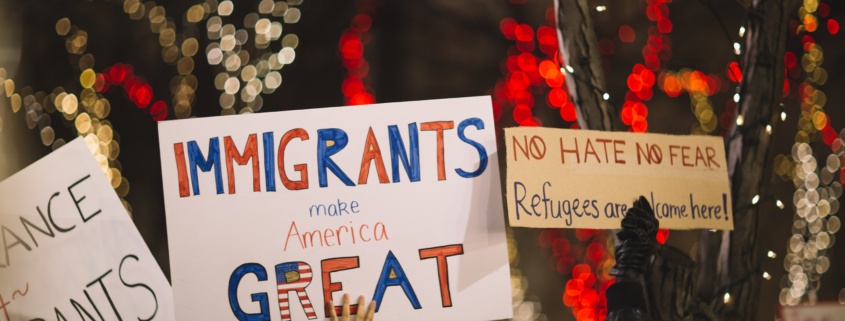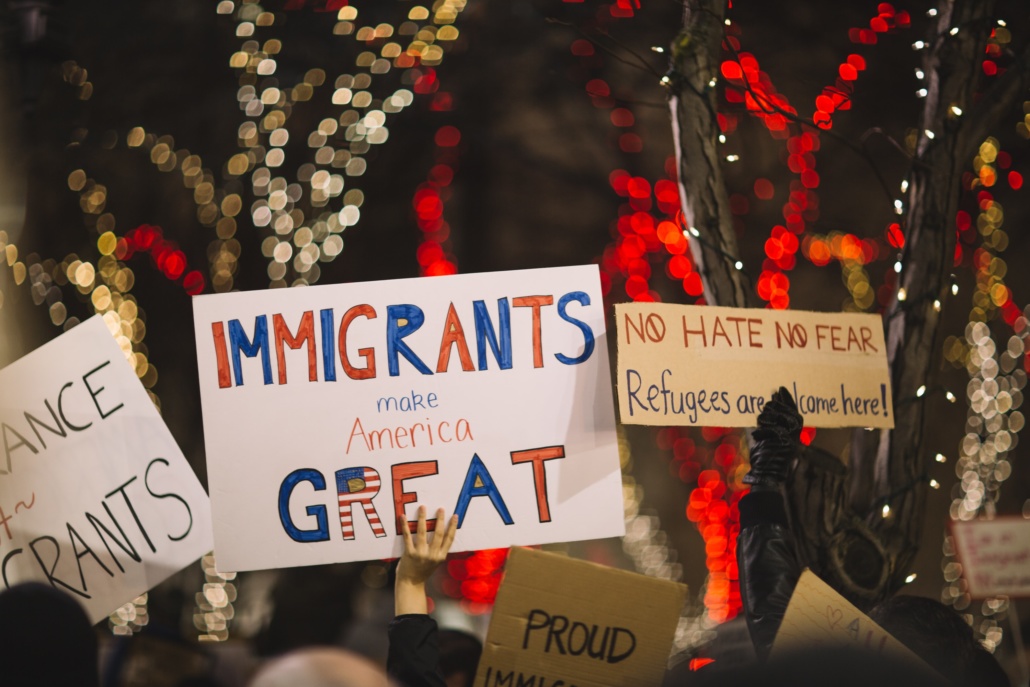Taking direct aim at Trump’s xenophobia, House Democrats pass NO BAN Act
by Aysha Qamar
For the past four years, advocates nationwide have been fighting the Trump administration’s xenophobic policies, including the Muslim Ban. In a historic moment that brought the nation one step closer to passing a civil rights law repealing such existing bans, the U.S. House of Representatives voted to pass the National Origin-Based Antidiscrimination for Nonimmigrants Act (NO BAN Act) on Wednesday. The NO BAN Act serves as the first potential piece of legislation to address Muslim civil rights. With its passage in the House, the bill now lies in the hands of the U.S. Senate to pass into law.
In addition to repealing bans against Muslim-majority countries, African countries, refugees, and asylum seekers, the bill will prohibit religious discrimination in immigration policies and impose limitations on how the administration is able to restrict immigrant entry, including requiring “a compelling government interest” for restrictions to be made. Under the current version, the NO BAN Act will also “amend the Immigration and Nationality Act (INA) to prohibit discrimination on the basis of religion and ensure that no president will ever again be able to ban an entire community without accountability,” according to civil rights organization Muslim Advocates.
“As the No Ban Act moves to the Senate, we encourage our communities to get involved and learn more about root causes, the history of the ban, and draw connections that build inter-community and intra-community solidarity. The only way we will produce transformative and lasting change is if we divest from playing into the hierarchies of the good citizen, immigrant, and Muslim that have often been at the expense of our own communities. Most importantly, we recommend that our communities hold on to visions of freedom and collective liberation to share what would humane and just immigration, refugee, and asylum policies, laws, and systems look like,” the Justice for Muslims Collective, a Muslim based advocacy organization said in a statement.
The NO BAN Act was introduced in April 2019 by Sen. Chris Coons of Delaware and Rep. Judy Chu of California; in February the House Judiciary Committee voted 22-10 in support of the NO BAN Act during the chamber’s first-ever hearing on Muslim civil rights. The House vote was previously scheduled for March but delayed due to the novel coronavirus pandemic. Organizations throughout the country came together to advocate against Donald Trump’s discriminatory bans that not only separated families but increased violence against minorities nationwide. Daily Kos joined a coalition of nine different organizations to deliver more than 150,000 signatures to the office of Rep. Judy Chu calling for the House to pass the bill.
Stories of individuals affected by the ban were shared during the bill’s hearing. Civil rights organizations applauded the House’s decision to pass the NO BAN Act and called on the Senate to do the same. The Council on American-Islamic Relations (CAIR), the nation’s largest Muslim civil rights and advocacy organization issued a statement on its website in which it thanked the House for its support toward Muslim Americans and urged the Senate to uphold the Constitution over bigotry.
“The only thing now standing in the way of Congress adopting the NO BAN Act is the willingness of U.S. Senate Republican leadership to show some moral backbone and fight back against Trump’s discriminatory, hateful, and un-American Muslim and African bans,” CAIR National Government Affairs Director Robert McCaw said. “If Republicans do not support the NO BAN Act, they can count on history remembering them for standing with a bigoted policy instead of the Constitution.
The bill saw a number of revisions as members of Congress and activists joined to ensure no president would follow in Trump’s footsteps and enforce xenophobic policies that bar individuals from entering the country based on their identity. While it passed in the House, many fear the bill may not pass the Senate due to strong opposition from Republicans and the White House, leaving it up for debate as the 2020 presidential elections draw near.
“It’s a very clear signal about what the House Democratic Caucus stands for,” Tom Jawetz, vice president of immigration policy at the Center for American Progress think tank said, as reported by Vox. “An incoming Biden administration can and should eliminate these bans by the stroke of a pen on day one. But that act itself will not stop a future administration from trying to shape an immigration system in his or her own anti-immigrant, racist image. This bill imposes important procedural and substantive constraints on that authority.”
On Monday, presumptive Democratic nominee Joe Biden pledged to end the Trump administration’s “vile Muslim ban” on his first day in office in addition to addressing issues of Islamophobia through hate crimes legislation like the Jabara-Heyer No Hate Act and the End Racial and Religious Profiling Act. “Muslim communities are the first to feel Donald Trump’s assault on Black and brown communities in this country, with his vile Muslim ban. That fight was the opening barrage in what has been nearly four years of constant pressure and insults,” Biden said at Emgage Action’s Million Muslim Votes Summit.
Four years have passed since Trump introduced his travel ban targeting Muslim majority countries, as per his campaign promise calling for a “total and complete shutdown of Muslims entering the United States.” In February, he expanded this ban to include six additional countries, bringing the total to 13 banned countries. A U.S. Supreme Court ruling in 2017 found that the president has the authority to impose the ban under existing U.S. immigration law. Unless this legislation passes, the current administration and others that follow will have the ability to suspend or restrict immigrants from entering the U.S. that they claim are a security risk.
Xenophobic policies are not new to our country. Laws restricting immigration have throughout our history limited not only Muslims, but also groups such as Jews, Catholics, and Asians from entering the U.S. While widely advocated by Muslim majority organizations, the NO Ban Act will not serve as a civil rights act just for Muslims but for all individuals and ensure religious discrimination in immigration policy ends for good.
“Today’s passage is, nevertheless, a big step forward, but with that comes an intense reminder of the work that still needs to be done on both sides of the aisle. We can celebrate this victory and simultaneously demand more from both Congress and the White House. We can enact laws and policies that do right by communities of color — in fact, we must,” Manar Waheed, senior legislative and advocacy counsel for the ACLU, said in a statement.
First published on Daily Kos
















2020
839 views
views
0
comments